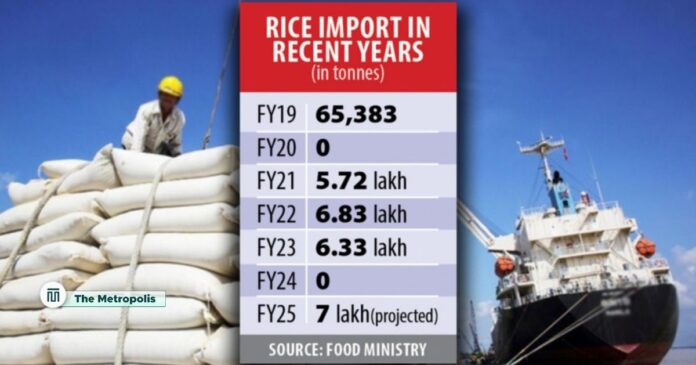The interim government is set to import seven lakh tonnes of rice, the highest in the last seven fiscal years, in an effort to bolster its dwindling food grain stock and alleviate the cost of living crisis faced by low- and fixed-income individuals struggling with prolonged high inflation.
Food Adviser Ali Imam Majumder noted that the cost of living has risen for various reasons in recent years, including natural disasters, which have driven up rice prices in the market. According to data from the Bangladesh Bureau of Statistics, inflation averaged 10.87 percent in the first half of fiscal 2024-25.
“This decision has been made to offer some relief to the people,” Majumder explained, adding that the rice would be sourced from multiple countries during this fiscal year.
Initially, it was estimated that around 10 lakh tonnes of rice would need to be imported, but this figure has been revised down to seven lakh tonnes, according to food ministry officials involved in the process.
Currently, the importation of 5.50 lakh tonnes of rice is underway. Of this, 3 lakh tonnes will be imported through an open tender process.
The government has also finalized plans to import 100,000 tonnes of rice from Myanmar under a government-to-government arrangement.
“The first consignment of 27,000 tonnes has already arrived, and another shipment will reach the country later this month,” Majumder said.
Additionally, 50,000 tonnes of rice will be imported from Pakistan through the G2G method.
Plans are also in place to import 1 lakh tonnes of rice from Vietnam via G2G, with necessary arrangements nearing completion.
Private sector businesspeople are also keen to import rice, given the zero tariff on rice imports for the private sector, Majumder added.
This move comes as the price of fine rice has increased by 4.05 percent in the past month, medium-grain rice by 3.31 percent, and coarse rice by 6.67 percent.
Over the past year, fine rice prices have risen by 12.41 percent, medium-grain rice by 15.74 percent, and coarse rice by 9.80 percent.
The prices are currently as follows: fine rice is selling for Tk 70 to Tk 84 per kg, coarse rice for Tk 54-58 per kg, and medium-grain rice for Tk 60-65 per kg, according to the Trading Corporation of Bangladesh.
The two consecutive floods in August and October last year damaged around three lakh hectares of cropland, as reported by the US Department of Agriculture in December.
Rice production in the current 2024-25 marketing year may be impacted by the reduced acreage of Aman season paddy, the report added.
Currently, there is a satisfactory stock of rice in the country, and necessary measures have been implemented to prevent future shortages, Majumder assured.
As of January 12, the public food grain stock stood at 12.25 lakh tonnes, including 8.2 lakh tonnes of rice, which is down 25 percent year-on-year.
Mohammad Jahangir Alam, a professor in the Department of Agribusiness and Marketing at Bangladesh Agricultural University, praised the government’s rice import initiative, both by public and private sectors, as a positive step to lower rice prices and ease the people’s suffering.
However, he stressed the importance of conducting a thorough analysis to determine whether the price hike is solely due to a supply shortage or if other factors are at play.
“The upward trend in rice prices seems to be beyond control,” Alam remarked.
He also highlighted the need to factor in transportation costs when importing rice.
“If rice is imported from distant countries, transportation costs will increase, which could lead to higher prices for consumers. Therefore, priority should be given to sourcing rice from countries that minimize transportation costs,” Alam advised.
Alam cautioned that excessive imports could negatively affect local farmers, urging the government to strike a balance between imports and domestic production.
“The impact on farmers should not be overlooked,” he concluded.



